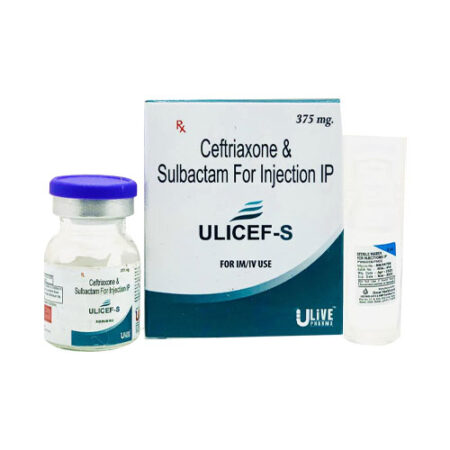
Meropenem Injection
UMERO-1G Injection
Meropenem injection helps to treat skin and stomach infections caused by bacteria and meningitis in adults and children 3 months of age and older. Meropenem injection is a type of medicine called antibiotics. It works by stopping bacteria that make us sick.
Medicine like meropenem injection can’t help with colds, the flu, or other viral infections. Using antibiotics when you don’t need them can make it more likely for you to get an infection in the future that is hard to treat with antibiotics.
How To Use?
- Meropenem injection is a powder that is mixed with liquid and given through a vein. It is usually given three times a day, every 8 hours. How long you need treatment depends on your overall health, the kind of infection you have, and how well the medicine works for you. Your doctor will tell you how many days to use the meropenem injection. Once you feel better, your doctor may give you a different medicine to take by mouth to finish your treatment.
- You can get a meropenem injection in the hospital, or you can give it to yourself at home. If you will get a meropenem injection at home, your doctor will teach you how to use it.
- You should start to feel better in the first few days of using the meropenem injection. If you don’t feel better or feel worse, call your doctor.
- Keep taking meropenem injections until the prescription is finished, even if you start to feel well. If you don’t keep taking meropenem injections full-time or miss doses, your infection may not go away and the bacteria may become strong against antibiotics.
- Ask your pharmacist or doctor for a copy of the instructions from the company that made the medicine.
Benefits
Meropenem injection is a strong medicine that is used to treat many different types of infections caused by bacteria. Here are some good things about using meropenem:
Broad Spectrum of Activity: Works against many kinds of bacteria, including ones that don’t respond to other antibiotics.
Treatment for very bad infections: Often used for serious infections like meningitis, pneumonia, sepsis, and infections in the belly.
Low resistance rates: Meropenem is less likely to be resisted by bacteria compared to other antibiotics. This makes it a good choice for treating patients in critical care.
Good Tissue Penetration: It moves into tissues and fluids, including the central nervous system, and helps to treat infections like meningitis.
Fast Acting: Meropenem quickly stops bacteria from making their cell walls, which helps to clear infections faster.
Compatibility with other Antibiotics: Able to work with other antibiotics to make them stronger against tough infections.
Safety Information: Usually okay for most people, with side effects that can be controlled better than some other antibiotics.
Side Effects
- Rash
- Headache
- Vomiting
- Nausea
- Itching
- Diarrhea
- Injection site inflammation
- Anemia
- Sepsis
- Constipation
- Apnea
- Shock
Precautions
- Your doctor needs to check how you or your child is doing when taking this medicine. This helps your doctor check if the medicine is working and decide if you should keep taking it.
- Meropenem can cause bad allergic reactions, like anaphylaxis, that can be very dangerous and need quick medical help. Tell your doctor or nurse immediately if you or your child have any itching, hives, trouble breathing, trouble swallowing, or swelling of your hands, face, or mouth after taking this medicine.
- This medicine can cause very bad skin reactions. Contact your doctor immediately if you experience skin blistering, peeling, red lesions, severe acne, skin rash, sores, ulcers, or fever/chills while taking this medicine.
- This medicine can cause some patients to shake or have uncontrolled movements. If you or your child have had seizures before and are taking medicine for it, keep taking the medicine unless your doctor tells you to stop. Inform your doctor if you are using divalproex sodium
- Meropenem can make you have diarrhea, and sometimes it can be very bad. It might happen 2 months or longer after you stop taking this medicine. Diarrhea medicine could make diarrhea worse or last longer. If you have any questions or if you still have mild diarrhea or if it gets worse, talk to your doctor.
- This medicine might make you have seizures, make you feel confused, give you headaches, or make you feel numb or tingly. Don’t drive or do anything risky until you understand how the medicine affects you.
- Do not take any other medicines unless you have talked to your doctor about them. This means all types of medicines, like ones you need a prescription for and ones you can buy without a prescription, as well as herbal or vitamin supplements.






